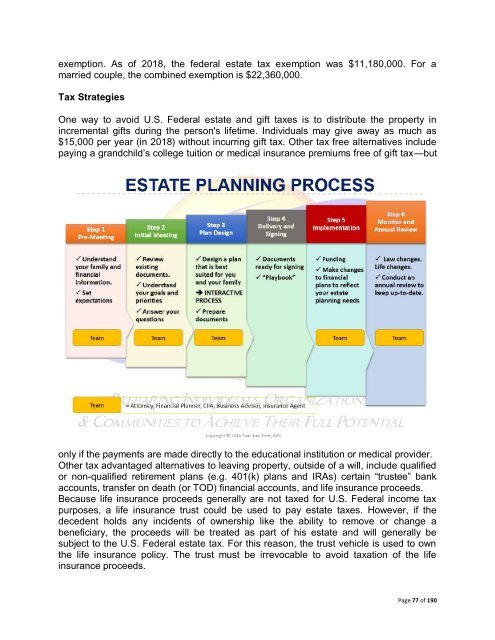Wills, Trusts & Estates
Wills, Trusts & Estates
Wills, Trusts & Estates
Create successful ePaper yourself
Turn your PDF publications into a flip-book with our unique Google optimized e-Paper software.
exemption. As of 2018, the federal estate tax exemption was $11,180,000. For a<br />
married couple, the combined exemption is $22,360,000.<br />
Tax Strategies<br />
One way to avoid U.S. Federal estate and gift taxes is to distribute the property in<br />
incremental gifts during the person's lifetime. Individuals may give away as much as<br />
$15,000 per year (in 2018) without incurring gift tax. Other tax free alternatives include<br />
paying a grandchild’s college tuition or medical insurance premiums free of gift tax—but<br />
only if the payments are made directly to the educational institution or medical provider.<br />
Other tax advantaged alternatives to leaving property, outside of a will, include qualified<br />
or non-qualified retirement plans (e.g. 401(k) plans and IRAs) certain “trustee” bank<br />
accounts, transfer on death (or TOD) financial accounts, and life insurance proceeds.<br />
Because life insurance proceeds generally are not taxed for U.S. Federal income tax<br />
purposes, a life insurance trust could be used to pay estate taxes. However, if the<br />
decedent holds any incidents of ownership like the ability to remove or change a<br />
beneficiary, the proceeds will be treated as part of his estate and will generally be<br />
subject to the U.S. Federal estate tax. For this reason, the trust vehicle is used to own<br />
the life insurance policy. The trust must be irrevocable to avoid taxation of the life<br />
insurance proceeds.<br />
Page 77 of 190

















